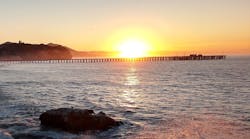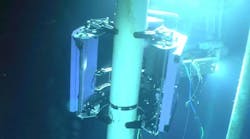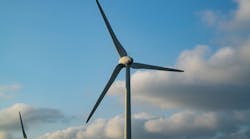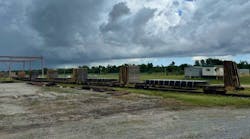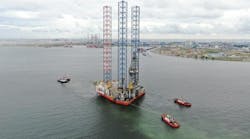BP and Shell are planning major investments in several areas during the next several years, notably the North Sea for both companies, plus the Gulf of Mexico for Shell, where the operator plans to develop three fields. In the UK, however, the possibility of increased offshore taxes could stifle some of the significant investment of these two operators and others. - Chevron and Texaco agreed to merge, reinstating their aborted effort from 1999. Chevron offered 35.1 billion in stock for Texaco, 0.77 share of Chevron for each Texaco share. This continues the recent consolidation process of the major oil companies that began in early 1999. It would take another merger with either ENI or TotalFinaElf to move the combined entities into direct contention with the three other supermajors.
BP is planning to spend more than $4 billion offshore the UK, Norway, and The Netherlands during the next four years. Shell is planning investments of about $1.2 billion in 2001 for operated developments off the UK, a 50% increase from the original plan. In the Gulf of Mexico, Shell plans to spend approximately $1.5 billion to develop four deepwater fields.
Meanwhile, UK North Sea operators are facing the prospect of higher taxes if the government decides to reduce gasoline and diesel taxes following protests, primarily by farmers and truckers, but also generally supported by the public. The tax regime was relaxed during a period of low oil prices. With forecasts that high prices could remain so for some time, the government is thinking taxation.
A report by Pure Research says the government tax revenue from the North Sea is likely to reach
- BP's plans to spend $4 billion involves several fields, including the West of Shetlands Clair field discovered in 1977. The operator will spend about $750 million initially on Clair, with life-of-field expenditures reaching $1.5 billion. If plans go forward as expected, development could begin next summer with construction work beginning in early 2002. The field will go onstream in 2004, producing 60,000 b/d of oil. Front end engineering and design was awarded to Wood Group Engineering, which will use their recently purchased subsidiary Mustang Engineering of Houston to assist. Interestingly, Mustang will develop the field under a plan that follows Gulf of Mexico practices, with the aim of reducing UK costs by 50%. "Leading Oil & Gas Industry Competitiveness" (LOGIC), a report by the UK Department of Trade and Industry (DTI), says that the industry could save at least 40% of project costs in the development of a typical mid-sized North Sea platform, with an estimated production of 100,000 b/d of oil equivalent, if Gulf of Mexico practices are adopted.
Shell's UK North Sea plans include bringing six new developments to sanction and doubling exploration and seismic spending. The developments include the Goldeneye, Penguins, Gossander and Mandarin prospects, plus two fields that remain unnamed for commercial confidentiality. The operator plans to double gas production during the next four years with $250 million of the total to be spent in the southern North Sea.
The company said annual exploration and seismic investment during the next five years will be 50% higher than this year's spending level, with Shell-only spending approaching $300 million over the period if anticipated finds are made.
- Shell will develop three deepwater Gulf of Mexico fields with a total investment of approximately $1.5 billion. The operator will develop the Oregano and Serrano discoveries in 3,400 ft water depth via a subsea production system tied back to the company's Auger tension-leg platform in 2,860 ft water depth. Each development is estimated to recover about 50 million boe. Serrano reserves are primarily gas while Oregano's reserves are primarily oil.
Total development costs for the two projects is approximately $250 million. Production start up for Serrano is scheduled for September 2001 and December 2001 for Oregano. Peak daily production rates are expected to reach 150 MMcf/d of gas and 20,000 b/d of oil.
The Na Kika development project, with Shell and BP equal partners, will include record-setting water depths for a subsea completion. The development project will ultimately consist of six subsea production systems servicing satellite fields tied back to a centrally located floating production system in the Mississippi Canyon area. The six fields are in water depths ranging from 5,800 ft to 7,600 ft.
The sixth field in 7,600 ft of water is solely owned by Shell and will be tied back to the host facility as production capacity becomes available. Total development costs of the Na Kika field are estimated at $1.3 billion. Estimated recoverable reserves are 300 million barrels of oil. Production is scheduled to begin at the first five wells in mid-2003 with peak daily production rates of 325 MMcf/d of gas and 100,000 b/d of oil.
Nigeria, Equatorial Guinea resolve maritime dispute
Nigeria and Equatorial Guinea formally approved a resolution to a long-standing dispute over their maritime boundary located on the deepwater fairway that could finally pave the way for additional exploration along the frontier area. The resolution to the long-standing dispute came about partly as a result of a significant foreign policy shift of President Olusegun Obasanjo's 16-month old government seeking to improve relations in the region.
The agreement involved Nigeria's recognition of Equatorial Guinea's sovereignty over the $1.5 billion ExxonMobil-operated Zafiro field plus associated fields. In return, Equatorial Guinea conceded acreage further south where Elf has rights on both sides of the disputed boundary.
The agreement also removes concerns over which country holds OPL 222, where an Elf, Canadian Oxy, Chevron and ExxonMobil partnership has been operating, and OPL 247, which is open. The agreement will likely boost oil exploration and development in deep waters between Biokos Island and the Niger Delta along the frontier where Elf, ExxonMobil and Ocean Energy all hold concessions.
